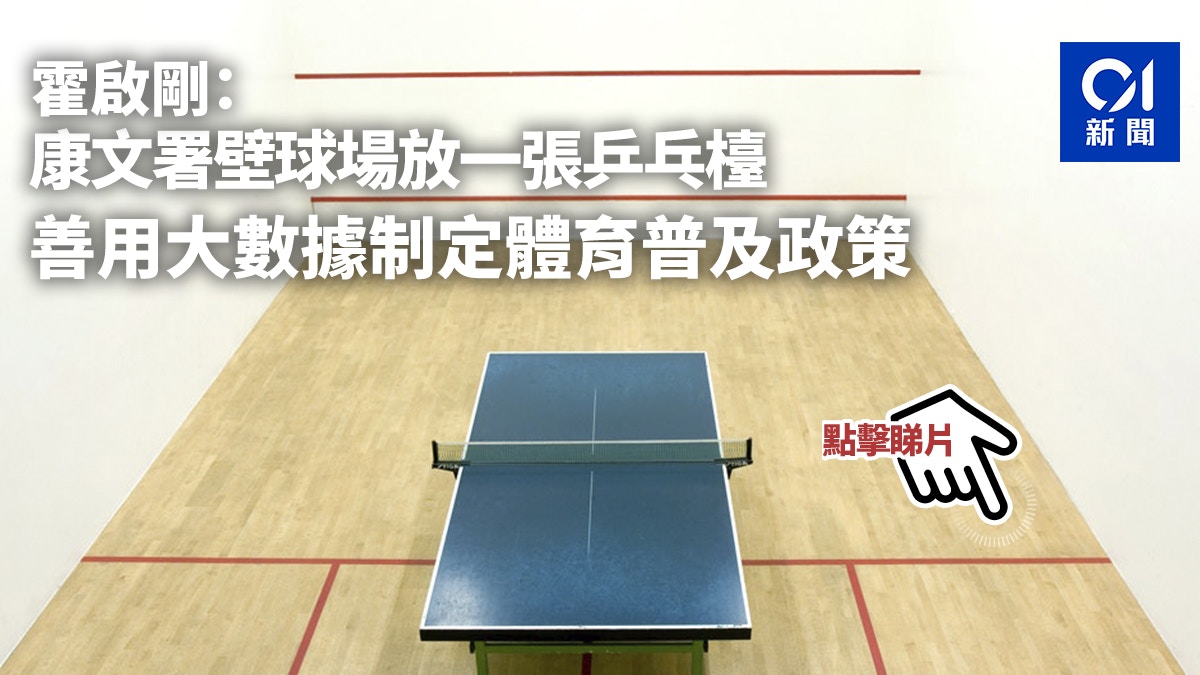The current sports policy of the Hong Kong government has been in use for nearly 20 years and is collectively referred to as the "three modernizations", which are "elite, popularized, and event-oriented."
The Hong Kong government's recurrent expenditure on local sports development continues to increase. The budgeted expenditure for 2019-20 is 5.8 billion yuan, an increase of 16% compared to the approximately 5 billion yuan spent in the previous year.
Huo Qigang, who is also the vice chairman of the Hong Kong Association and Olympic Committee, believes that popularization is the most important part of the sports policy, because to promote industrialization, mass support is indispensable.
In fact, in 2018-19, the government spent nearly 4.3 billion yuan in promoting sports for all, accounting for about 86% of the total expenditure. Does it really reflect the deployment of resources?
[Hong Kong Sports Policy Conception.
Series Three]
Related Reading:
Interview|The diving queen turns into an Olympic referee Guo Jingjing: I hope to have a greater right to speak in the sports arena
Interview|Skateboard variable elite project?
Huo Qigang: Sports policy should replace reward mentality with investment
Huo Qigang called on the government to collect more data for the purpose of formulating popularization policies.
(Photo by Huang Baoying)
"Now is the era of big data, how can you formulate policies if you don't have data?" Huo Qigang expressed feelings about the "universal" policy.
He strongly supports that the government should conduct in-depth research on the popularization of sports policies. He even boldly suggested that the government should include the citizens’ preferences and opinions on sports, such as lifestyle habits and sports, etc., in the national census, so that the government can Have a basis when formulating policies.
Looking through the information, the last survey on the popularity of sports in Hong Kong, which included children, young people and adults, was in 2009.
At that time, it was carried out and submitted by the Community Sports Committee under the Sports Committee, the Leisure and Cultural Services Department and the Department of Sports Science of CUHK.
The results of the survey at that time found that 65.5% of Hong Kong citizens 7 years of age or older stated that they had participated in sports at least once in the past 3 months.
The Hong Kong Sports Fund announced in October last year the results of the pilot study of the "Study on Hours of Participation in Sports for Primary and Secondary School Students". It found that only 5.2% of the youths aged 5 to 17 in Hong Kong had their daily sports participation hours in line with WHO standards.
(Profile picture)
Unofficial surveys are conducted more frequently. In October last year, the Hong Kong Sports Fund announced the results of the pilot study of the "Study on Hours of Participation in Sports for Primary and Secondary School Students". It was found that only 5.2% of Hong Kong youths aged 5 to 17 participated in daily sports activities. The number meets the WHO standard, and only 23.7% of the people met the standard on weekends.
The WHO recommends that adolescents between the ages of 5 and 17 should engage in at least 60 minutes of moderate-to-high-intensity physical activity a day, such as jogging and swimming. The survey revealed that the youth in Hong Kong do not exercise adequately.
Regarding the reason why sports cannot be truly popularized even if a large amount of resources are invested, Huo Qigang believes that there is "no KPI (key performance indicator)", and each district’s respective regional sports clubs have different goals and hold different activities, but there is no common ground. Goals and targets are different.
"The Leisure and Cultural Services Department does not have KPIs, and there are no hard and fast indicators to encourage everyone to do sports. For example, participation, or even social cohesion achieved through sports, etc."
The future of sports development in Hong Kong should be "industrialized" and "professionalized" in addition to "elite, popularized, and event-oriented".
Huo Qigang believes that these major directions are interlocking and indispensable.
He pointed out that the foundation of industrialization is the masses of consumers, and there must be enough people to support the industry in order to be supported by businesses.
For example, he said that the current secondary school competitions are well run, "but the New Territories are held separately from Hong Kong and Kowloon, and there is no territory-wide academic competitions". Can someone take the lead in organizing the competitions and establish a ladder and student athletes can represent Hong Kong to other places. For example Competing in the Greater Bay Area?
"The popularization policy must be based on KPIs, have clear goals, and be promoted from top to bottom to succeed." Huo Qigang cited the United States as an example, pointing out that the country's sports industry is successful because of the success of academic competitions.
Popularization drives industrialization, which is enough to raise elite athletes.
Huo Qigang pointed out that sports-related urban planning is very outdated. For example, the squash courts of the Leisure and Cultural Services Department’s venues are often only equipped with a ping-pong table, which is wasteful and the utilization rate is very low (Photo on the LCSD website)
Although the popularity of sports still has room for improvement, it is often heard from sports fans that it is extremely difficult to make reservations for the LCSD venues.
"In the long run, it is sports-related urban planning. The current planning is very outdated. For example, the squash courts under the management of the Leisure and Cultural Services Department often only have a ping-pong wave table, which is wasteful and the utilization rate is very low; For example, the Tennis Association is often accused of low usage rate of tennis courts, but the situation is that the government is unwilling to cover the existing open-air tennis courts. Once it rains, there will be no play. These really need to be improved point by point."
01News
Interview|Skateboard variable elite project? Huo Qigang: Sports policy should replace the mentality of rewards with investment. The East Olympics' good achievements | How much credit is Gou Zhongwen behind the "sports director" who was besieged and won the 38 gold? Hong Kong Athletes|Not only should sports investment be increased, but also the general governance of Hong Kong Athletes should be improved. Sports policies must break through the bottleneck. Can clear KPIs solve the problem?










/cloudfront-eu-central-1.images.arcpublishing.com/prisa/2C5HI6YHNFHDLJSBNWHOIAS2AE.jpeg)



